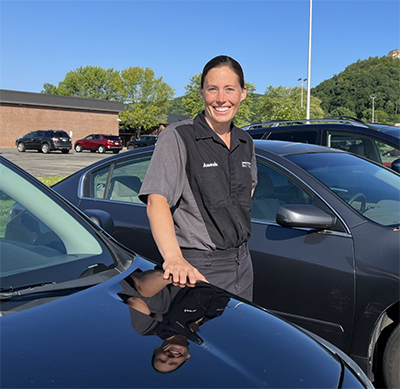Donated vehicles give MSC Southeast automotive program students real-world, hands-on experience
 Amanda Evenson, the Automotive Technology instructor at Minnesota State College Southeast, would like you to consider donating a car to the college's automotive programs.
Amanda Evenson, the Automotive Technology instructor at Minnesota State College Southeast, would like you to consider donating a car to the college's automotive programs.
"Donated cars provide a great learning opportunity for our students," she explained. "I don't believe in modified training aids, which is what many auto programs use. Our goal in the automotive programs is to give the students as much guided, hands-on, real-world experience as we can."
Both the Automotive Technology and the Auto Body Collision Technology programs at the college rely on donated vehicles to give students the best experience as to what they will be seeing in industry.
Donated vehicles don't have to be drivable, but they do have to be moveable.
"The engine, transmission, or even the brakes could be inoperative," Amanda said. "Even if the vehicle is towed in that is fine as well. As long as it is on wheels and able to be pushed around, it will work for the programs."
Cars don't have to be brand new, but Amanda said the newer the vehicle, the better.
"We try to stay as current as possible with technology, so newer models are more useful. However, we will accept a vehicle year 2000 and newer."
Donated cars can be written off for tax purposes. "We fill out a form with vehicle and customer information. The vehicle is given a value and then the customer receives an acknowledgment of donation from the college that they can use on their taxes," Amanda said.
Please keep in mind that a clear title is a requirement. "It must have a title with no liens," she noted. "The donation acknowledgment will be sent to the person who is listed on the title."
How the cars are used
Students in the Automotive Technology programs work with donated vehicles starting in their first semester. The students disassemble and assemble components on the vehicles to learn how to use various tools, solve problems, and identify components.
By the end of the semester the vehicles are completely disassembled from interiors to bumpers. Electrical harnesses, windows, and even engine and transmissions are removed.
"After that, the vehicle components are reused for later class labs such as transmission and engine disassembly and diagnostics," Amanda said. "We even re-use clips and fasteners."
In the Auto Body Collision Technology program, vehicles are used in a similar manner, but instructor Brandon Boynton also utilizes body panels for student learning.
Brandon creates damage to body components, simulating different types of real-world collisions, for the students to repair. The vehicles would be completely torn down by the end of the semester as well.
"Anything from the vehicle can be used as a teaching aid," Amanda said. "Vehicles that are left are used for various labs throughout the program for diagnostics. For example, I will deliberately put an electrical issue into a vehicle and the students have to use their resources and skills to find and repair the problem."
Any parts that are not used or needed will eventually be taken to the salvage yard. Money made from the salvage goes back into the programs for future supplies.
Customer repair work
The automotive programs also take in some customer vehicles for repairs (model years 2000 and newer), depending on the time and skills that students have, tasks being taught, and whether the repairs fit the curriculum.
Due to the students' being in training, repairs will take a longer time. Amanda said that customers pay for parts and some labor to help recover shop operating costs. Estimates are given in advance.
"The bottom line is that when our graduates get to industry they are experienced and efficient, which is great for employers, customers, and technicians," Amanda said. "Customer vehicles and donations help us make that level of real-world learning possible."
Amanda would like to give a big thanks to all of those that have given donations in the past.
"Many community members, students, alumni, local dealerships, and salvage yards have donated vehicles to our programs over the years," she said. "It has very much been appreciated by the instructors and the students. Thank you!"
For more information or to donate a vehicle to Minnesota State College Southeast, contact Amanda Evenson at [email protected] or 507-453-2666.